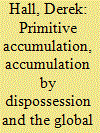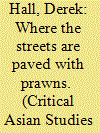| Srl | Item |
| 1 |
ID:
124925


|
|
|
|
|
| Publication |
2013.
|
| Summary/Abstract |
Critical scholars have made extensive use of the concepts of primitive accumulation and accumulation by dispossession to analyse the global land grab. These concepts have been crucial to efforts to understand the land grab in terms of the creation, expansion and reproduction of capitalist social relations, of accumulation by extra-economic means, and of dispossessory responses to capitalist crises. This paper provides an overview of these approaches. It also argues that there are substantial challenges involved in the use of primitive accumulation and accumulation by dispossession, including tensions and ambiguities over what the concepts mean, the assumptions embedded within them and problems of fit with other conceptualisations of the land grab. The paper also highlights resources for engaging with these challenges in the land grab literature.
|
|
|
|
|
|
|
|
|
|
|
|
|
|
|
|
| 2 |
ID:
102936


|
|
|
|
|
| Publication |
2011.
|
| Summary/Abstract |
This paper argues that the frequent references to zombies in analyses of the recent global financial crisis can be harnessed as a "teachable moment" for students of Comparative Political Economy. I claim that two zombie movies in particular-Britain's 28 Days Later and Japan's Wild Zero-can be viewed as if they were allegories of two different national forms of capitalism that are integrated into, and affect, the global political economy in different ways. While 28 Days Later displays remarkable similarities to Marxist accounts of the origins and dynamics of capitalism in England, Wild Zero can be seen as an account of the post-1985 dynamics of the Japanese political economy and its engagement with Asia. This paper gives concrete suggestions for the use of zombie films in the classroom. It concludes with the argument that these two films help to explain why references to "zombie capitalism" cross ideological lines.
|
|
|
|
|
|
|
|
|
|
|
|
|
|
|
|
| 3 |
ID:
108323


|
|
|
|
|
| Publication |
2011.
|
| Summary/Abstract |
As the proportion of the gross domestic product of Southeast Asian countries accounted for by agriculture continues its long-term decline, it is natural in studying regional migration flows to emphasize the ways people are moving away from farming. Across the region, however, millions of people continue to migrate both within and across international borders to take part in agricultural production. Many of them are moving to grow "boom crops" like cocoa, coffee, oil palm, rubber, and shrimp, all of which have seen rapid expansion over the last two decades. In this article, the author provides a comparative survey of the links between crop booms and migration in Southeast Asia, arguing that this migration has taken three main forms: relatively autonomous and "spontaneous" migration by households or individuals looking to set up as boom crop-growing smallholders; a "transmigration" model in which parastatal agencies or private corporations with state support help migrants to relocate so that they can take part in organized farming schemes with at least some smallholder component; and migration for the purpose of working as waged laborers for plantations or richer smallholders growing boom crops. The importance of these types of migration has varied across crops. In the conclusion, the author makes several points about the politics of migration and crop booms.
|
|
|
|
|
|
|
|
|
|
|
|
|
|
|
|